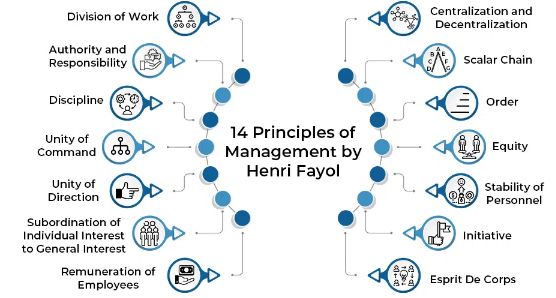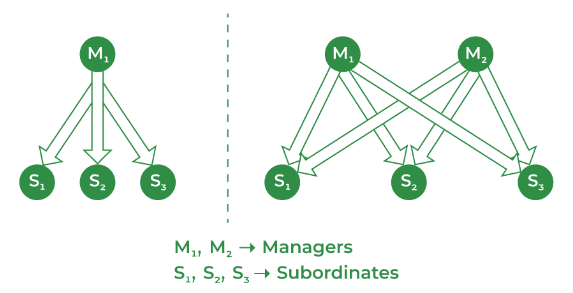
- Introduction to Henri Fayol
- Development of 14 Principles
- Division of Work
- Authority and Responsibility
- Discipline
- Unity of Command
- Unity of Direction
- Conclusion
Introduction to Henri Fayol
Henri Fayol (1841–1925) was a French mining engineer and management theorist, who is often referred to as one of the pioneers in the field of management theory. Fayol’s contributions to management thought were profound and formed the foundation for the development of modern management practices. His work is still considered highly influential, and many of his principles remain relevant in the study and practice of management today. Fayol’s theories were largely based on his experiences as a manager and director of a mining company. He worked for the Commentry-Fourchambault company for several decades, and during that time, he developed and refined his ideas about management and leadership. Fayol’s major contribution to management theory was the development of a set of principles that he believed should guide management practices across all levels of an organization. These principles were designed to provide a comprehensive approach to the organization of work and the management of human resources. His ideas were developed and published in his 1916 book “Administration Industrielle et Générale” (“General and Industrial Management”). Fayol’s theories are often contrasted with the more technical and process-focused theories of Frederick Taylor and his followers, who focused on scientific management and efficiency. Fayol, on the other hand, focused more on the general aspects of management and leadership, emphasizing the importance of the role of the manager in shaping organizational outcomes. One of his most notable contributions was the formulation of 14 principles of management that remain essential in understanding organizational dynamics today.
Development of 14 Principles
Fayol’s 14 principles of management serve as a foundational framework for understanding effective management practices within organizations. Developed by Henri Fayol in the early 20th century, these principles were based on his practical experience as a manager and his observations of how successful organizations functioned. Fayol believed that management was a skill that could be taught and improved upon, and his principles were intended to bring structure, discipline, and clarity to managerial roles. Despite the time that has passed since their introduction, these principles remain highly relevant and are often referenced in modern management education and practice. The 14 principles emphasize key aspects of organizational behavior and leadership, aiming to promote efficiency, cooperation, and accountability. Principles such as Division of Work highlight the importance of specialization for improved productivity, while Authority and Responsibility underscore the need for a balance between power and accountability. Unity of Command and Unity of Direction ensure consistency in supervision and goals, while Discipline reinforces the need for respect and order. Fayol’s theories also emphasized human-centered principles such as Equity, Stability of Tenure, and Esprit de Corps, promoting fairness, loyalty, and team spirit within the workplace.

Concepts like Centralization, Scalar Chain, and Order deal with organizational structure and hierarchy, ensuring a clear chain of command and efficient use of resources. Initiative encourages employee involvement, while Subordination of Individual Interests reminds managers to prioritize organizational goals. Overall, Fayol’s principles offer timeless guidance for managers striving to create effective, organized, and harmonious workplaces.
Division of Work
- Core Idea: Fayol’s principle of division of work states that dividing work among individuals and groups increases efficiency and productivity.
- Specialization Benefits: Specialization allows workers to focus on specific tasks, leading to enhanced skills and expertise in their particular functions.
- Increased Productivity: When employees specialize, they perform tasks faster and with greater accuracy, resulting in higher overall productivity.
- Better Use of Human Resources: Dividing work ensures that employees are assigned tasks that match their skills and strengths, optimizing resource utilization.
- Personal Development: Specialization helps workers develop deeper knowledge and competence in their areas, contributing to their professional growth.
- Organizational Efficiency: By assigning clear responsibilities and reducing overlap, the organization functions smoothly with less confusion and duplication of effort.
- Practical Application: For example, departments like marketing, finance, production, and human resources specialize in their roles, enabling focused efforts and improved results.
- Definition of Authority: Authority is the formal right given to a person to make decisions, give orders, and allocate resources to achieve organizational goals.
- Definition of Responsibility: Responsibility is the duty or obligation to perform assigned tasks and be accountable for the outcomes.
- Relationship Between Authority and Responsibility: Authority and responsibility go hand in hand while authority gives the power to act, responsibility ensures that the person is answerable for their actions.
- Delegation: Authority can be delegated to subordinates, but responsibility usually cannot be delegated; the person delegating remains accountable.
- Scope: Authority flows downward in the organizational hierarchy, whereas responsibility flows upward, as employees report back on their work.
- Importance in Management: Clear authority and responsibility help avoid confusion, ensure proper supervision, and enable smooth functioning of the organization.
- Balance is Essential: Effective management requires a balance between authority and responsibility; too much authority without responsibility may lead to misuse of power, and responsibility without authority can cause frustration.
- Definition: Unity of Command is a management principle stating that each employee should receive orders and instructions from only one superior or manager.
- Purpose: This principle aims to avoid confusion, conflicts, and misunderstandings in the workplace by providing a clear reporting structure.
- Clear Accountability: When an employee reports to a single manager, it becomes easier to assign responsibility and evaluate performance effectively.
- Improved Communication: Unity of Command streamlines communication, ensuring that instructions are consistent and that employees are not caught between conflicting orders.
- Conflict Reduction: By following a single chain of command, the chances of receiving contradictory directions from multiple supervisors are minimized, reducing workplace conflicts.
- Enhanced Discipline: Clear authority lines help maintain discipline as employees know exactly whose instructions to follow and who is accountable for their actions.
- Organizational Efficiency: Unity of Command contributes to smoother operations, better coordination, and increased efficiency, as employees have clear guidance and support.
Authority and Responsibility

Discipline
Fayol’s principle of discipline highlights the necessity of maintaining order, respect, and compliance within an organization. According to Henri Fayol, discipline is a key element for ensuring that employees act in accordance with established rules, policies, and procedures. It is not solely about punishment but about cultivating a culture of accountability and professionalism. A disciplined workforce contributes directly to operational efficiency and the successful achievement of organizational objectives. When employees understand what is expected of them and follow guidelines consistently, the organization can function smoothly without disruptions or misunderstandings. Effective discipline begins with clear communication. Managers must set well-defined expectations regarding behavior, responsibilities, and performance standards. This includes providing proper orientation and ongoing training to help employees understand organizational rules. At the same time, discipline must be applied fairly and consistently. Fayol believed that unjust or overly harsh disciplinary actions could lead to resentment and reduced morale, whereas fair treatment would foster respect and cooperation among team members. Moreover, discipline should not be viewed merely as corrective action but as a proactive effort to encourage good conduct and a strong work ethic. Managers play a crucial role in modeling disciplined behavior and reinforcing it through positive leadership. When employees are treated with fairness and their contributions are recognized, they are more likely to adhere to rules voluntarily. In today’s context, Fayol’s principle remains highly relevant, as maintaining discipline continues to be essential for sustaining a productive, respectful, and goal-oriented organizational environment.
Unity of Command
Unity of Direction
Fayol’s principle of unity of direction underscores the importance of having one clear objective and a coordinated plan guiding all activities within an organization. This principle is essential for maintaining focus and consistency, especially in large and complex organizations where multiple departments and teams handle varied responsibilities. Fayol’s theories believed that when all efforts are directed toward a common goal, the chances of success increase significantly. Without unity of direction, different departments may pursue their own agendas, leading to confusion, inefficiencies, and even internal conflict. Unity of direction ensures that everyone within the organization is working toward the same overall objectives, regardless of their individual tasks or departmental functions. It creates coherence across the organization, aligning strategies, processes, and resources to serve a unified purpose. For example, a company aiming to increase its market share must ensure that its marketing, sales, product development, and customer service teams are all contributing to that goal through coordinated actions. If the marketing team focuses on brand awareness while the sales team targets short-term revenue, their efforts may not complement each other, resulting in missed opportunities. To implement unity of direction effectively, managers must clearly communicate the organization’s goals and develop plans that align departmental efforts with those goals. Regular cross-functional coordination, progress reviews, and shared performance metrics can help maintain this alignment. In today’s dynamic business environment, unity of direction remains a vital management principle for achieving strategic objectives, fostering teamwork, and maximizing organizational efficiency.
Conclusion
Henri Fayol’s contributions to management theory have played a foundational role in shaping modern organizational practices. His 14 principles of management, developed in the early 20th century, were among the first structured attempts to define the core responsibilities and best practices of effective management. These principles provide managers with a comprehensive framework for organizing resources, directing employees, and maintaining efficiency within an organization. Although formulated more than a century ago, Fayol’s ideas remain highly relevant in today’s dynamic and complex business environments. Fayol emphasized core concepts such as division of work, which enhances productivity through specialization, and authority and responsibility, which ensures that power is balanced with accountability. His principle of unity of command, which states that employees should receive instructions from only one superior, is still considered essential for maintaining clarity and discipline within organizational structures. He also highlighted the importance of fair remuneration, order, discipline, and equity, recognizing that effective management must focus on both structure and human values. Fayol’s emphasis on the subordination of individual interests to organizational goals, the encouragement of initiative, and the importance of team spirit reflects his understanding of the social dimensions of work. As organizations continue to evolve in response to technological advancements and global challenges, Fayol’s principles offer enduring guidance on how to manage people and processes effectively. His legacy remains a cornerstone of modern management education, and his ideas continue to influence how managers lead, motivate, and build efficient and cohesive organizations across the world.





